When starting a blog, you’re purposefully searching for keywords that would attract new readers who found your content through search engines, or even AI chatbots like Perplexity that mention the source.
One of the most important ways is to attract visitors through organic search (SEO) and rank with certain keywords or subjects as high as possible.
If you’re new to SEO, then here’s a brief definition:
SEO, or Search Engine Optimization, is the practice of improving the visibility and ranking of a website or web page in search engine results pages (SERPS), such as Google and Bing.
The main objectives are:
- Increase organic (non-paid) traffic to your blog
- Make content more accessible and relevant to users
- Improve the website’s position, which can lead to more clicks
But SEO is a slow process. It’s a marathon, and inexperienced bloggers or content creators abandon their blog too fast before seeing any results.
The Keyword Golden Ratio method is great for new bloggers because:
- It can rank keywords within 24 hours
- It keeps you motivated because you’re able to see immediate results
You could rank hundreds of keywords in months, instead of years.
What Is Keyword Golden Ratio?
KGR (Keyword Golden Ratio) is a simple technique that helps you identify low competition keywords by using a simple ALLINTITLE: command.
KGR = (“allintitle” results)divided by (search volume)
If the result is less than 0.25, the search term is considered a KGR keyword.
I will explain this with a few examples later in this guide.
4 Reasons Why You Should Use Keyword Golden Ratio
- It’s beginner-friendly – anyone can do it
- It removes complications
- It helps you understand SEO faster
- You’re not required to use a lot of expensive SEO tools
My observation is that many new niche bloggers feel overwhelmed by SEO. It feels more like a science project, and they’re often discouraged by the buzzwords provided by “SEO experts” selling $10 courses, and yet claim to make 6-figures per month blogging.
When you’re a beginner, eliminate all the noise and focus on this simple method that’s based on math and logic.
Misconception Around Longtail Keywords
When you scour Reddit or other social media platforms, the general advice from people is to target and use longtail keywords for your niche.
That is, in my opinion, a generalization and unclear answer because it doesn’t make beginners understand how to interpret that.
The Keyword Golden Ratio technique also uses longtail keywords, but it doesn’t mean they’re the right fit to rank from day one.
The usual explanation goes like this:
- Find longtail keywords
- Target the ones with a low search volume
- Target the ones with a low keyword difficulty/competition
- Start ranking
But here’s the kicker:
- Low search volume doesn’t mean it’s easy to rank on
- Keyword tools that indicate low competition are not always accurate
The majority of SEO tools (if not all) provide delayed data.
Zero, or extremely low volume in keywords, for example, is never really zero.
How To Use the Keyword Golden Ratio? (Example)
I will provide a simple example for you. And for this example, I will be using Ubersuggest.
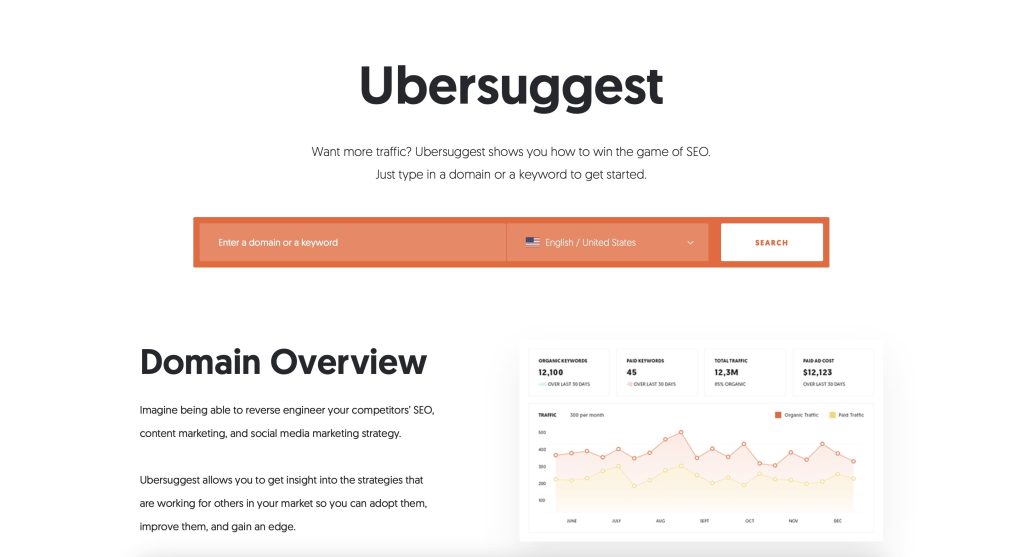
It’s an easy-to-use keyword tool that’s been underappreciated by seasoned SEO experts or bloggers.
I found it extremely helpful when you’re new to blogging and aren’t ready yet to spend hundreds of dollars on premium SEO tools like Ahrefs or SEMRUSH.
Let’s assume you’re creating a travel blog. And there are two possible longtail keywords you’re targeting:
- Can you travel with batteries
- Traveling with batteries
Here’s the breakdown:
“Can you travel with batteries” has:
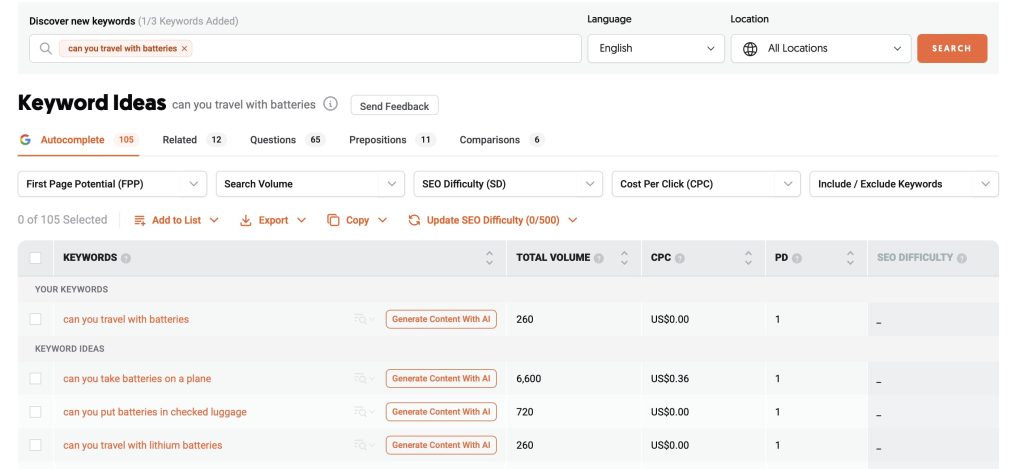
- 260 monthly search volume
- Paid difficulty of 1
- SEO difficulty of 0
“Traveling with batteries” has:
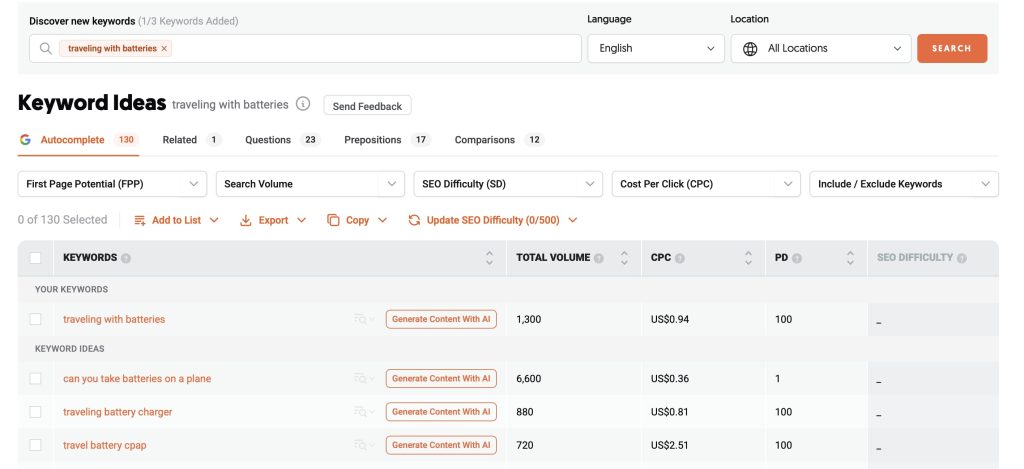
- 1300 monthly search volume
- Paid difficulty of 100
- SEO difficulty of 0
Our instincts will tell us to go for the secondary keyword, because there’s a higher search volume and the SEO difficulty is equal to the other keyword.
If we were to apply the KGR formula, we would find the following:
- allintitle: can you travel with batteries
- 4 exact search results

4 exact results divided by a 260 keyword volume = 4/260 = 0.015 KGR
- allintitle: traveling with batteries
- 145 exact search results

145 exact search results divided by a 1300 keyword volume = 145/1300 =0.112 KGR
The real surprise is that they’re both below the 0.25 threshold from the KGR formula, and you can use both search terms for two different blog posts.
And I would encourage you to do that.
Because it’s a great way for you to build some additional topical authority around the subject and keywords.
- My preference is to target keywords with a volume lower than 1000 first
- Make a list of similar keywords to create topical authority, and start planning
- Keyword volume is not an indicator of whether you’re easily going to rank with it
Keyword Volume Vs KGR
In the first example, I showed you two similar keyword phrases with different search volumes.
Both examples were viable, but keyword volume doesn’t mean much when you’re using the Keyword Golden Ratio method.
You don’t believe me?
Here’s another example on how search volume can be deceiving.
We’re going with:
- Can you take batteries on a plane
- How to fly with batteries
“Can you take batteries on a plane” has:
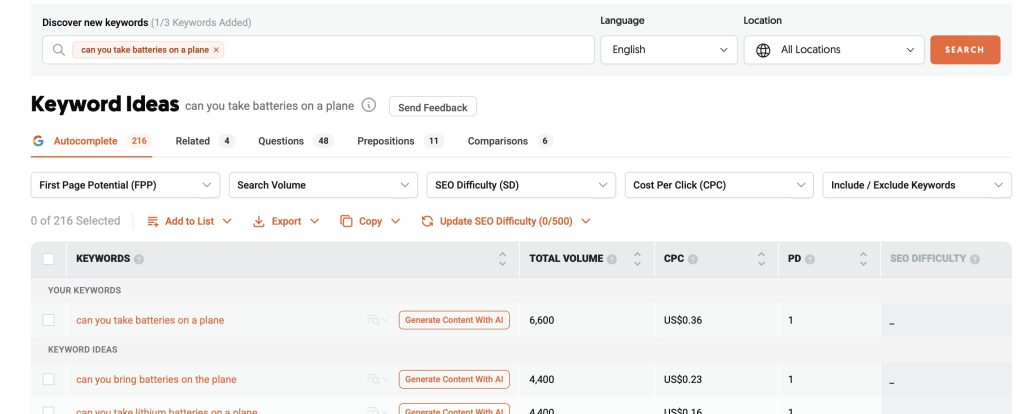
- 6600 monthly search volume
- Paid difficulty of 1
- SEO difficulty of 0
“How to fly with batteries” has:
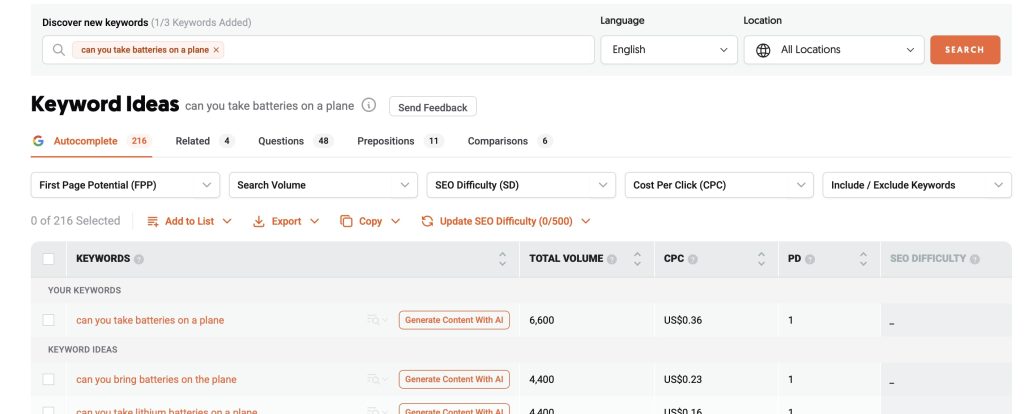
- 70 monthly search volume
- Paid difficulty of 1
- SEO difficulty of 0
It looks attractive to target that low-volume keyword with only 70 monthly searches, but the reality will hit you differently:

- allintitle: can you take batteries on a plane
- 10 exact search results
10 exact search results divided by a 6600 keyword volume = 10/6600 = 0.0015 KGR

- allintitle: how to fly with batteries
- 65 exact search results
65 exact search results divided by a 70 keyword volume = 64/70 = 0.92 KGR
You shouldn’t even consider the secondary search term. It’s completely out of balance for starting niche blogs.
What’s The Goal With Keyword Golden Ratio?
In essence, KGR is a data-driven approach that focuses on finding longtail keywords that have greater demand for content than supply.
It’s a simple formula for you to identify low-competition keywords, which can lead to the following:
- Rank fast(er) in the top 100 search results
- Acquire data and impressions for Google Search Console and Analytics
- Makes it easier to create a structured content plan with similar topics
It might not have a big impact in the beginning, but imagine you’re repeating this process with hundreds of keywords and blog posts?
Once you have established some authority and traffic, you could balance between:
- More competitive keywords
- Add additional topics that strengthen your topical authority
Why I Don’t Use KGR Every Time
I am a big fan of this method, but the majority of my content is not written with a Keyword Golden Ratio method.
That’s because I love to just write sometimes and ignore the SEO rules.
It also helps me balance between well-researched content and emphasize that a human is responsible for the content. Not an AI writing tool or ChatGPT.
If you’re starting a niche blog, one of your goals is to attract an audience that understands who you are and what you’re interested in.
My advice is that you shouldn’t overthink your SEO strategy in the beginning, and just start writing.
Because your first 20-50 blog posts might suck.
But that’s okay.
You can always revisit your content later and optimize/tweak your sentences after.
By NOT thinking about “SEO optimized content”, I found that I write better.
That type of content is often linked with other blog posts that were written according to the KGR method.
Final Word
SEO doesn’t have to be complicated for beginners. This simple method is one of my favorite ethical SEO strategies for bloggers.
Sure, you might not rank in the top spots. But I would take it as a win if I were to rank with a blog post within 24 hours, somewhere around page 4 or 5.
Using KGR will still help you rank faster than any other method. And it’s a bulletproof method against Google Updates without the need of “gaming the system”.
I consider the Keyword Golden Ratio an easily scalable strategy to rank fast and acquire data that helps me stay motivated in my blogging efforts.
Give it a try, you won’t regret it!
